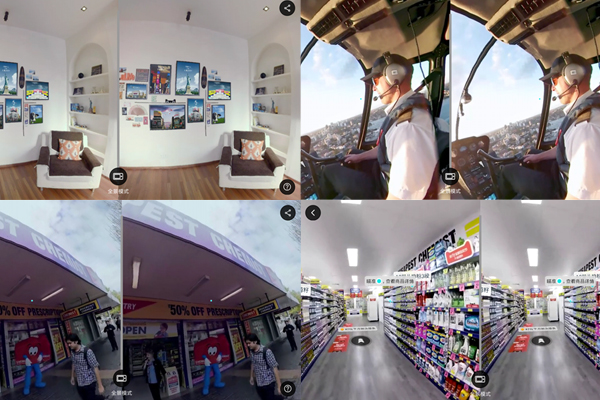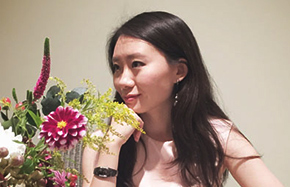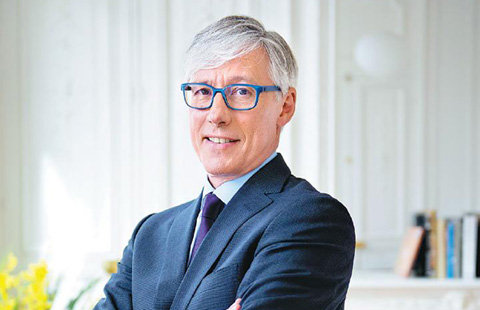Painting a picture of colorful growth
 |
|
Lin Liangqi, president of AkzoNobel China. [Photo provided to China Daily] |
AkzoNobel sees sales in China account for 60% of Asia-Pacific coatings market
Smoky gray garments, baby blue tie, dusty pink shirt, jet-black brogues and amber wristband, Lin Liangqi's look is on the colorful side of the dress-code spectrum. The president of AkzoNobel China and managing director of Decorative Paints China and North Asia is sitting on a sofa in front of a denim-drift colored wall.
This is not just a coincidence. His relaxed demeanor and precise location carry a message. Denim drift is the Color of the Year 2017, according to Color Futures by Dulux, AkzoNobel's decorative paints brand, "a color that is both calming and inspiring, which is a good choice for study, or a child's room", said Lin.
Decorative paint in China has been a spectacular beneficiary of the country's urbanization drive. Massive numbers of new residences have been built all over the country, be they residential or commercial, meaning that huge unadorned spaces needed to be painted.
According to the National Bureau of Statistics, properties with a combined space of about 1.05 billion square meters were sold in China in the first three quarters of 2016, a 26.9 percent year-on-year increase. Sales of decorative paints have soared.
Multinational decorative paints players, including AkzoNobel NV, PPG Industries Inc, SACAL and Nippon Paint, are all eyeing the fast growth of the China market, which accounts for some 25 percent of the global consumption of paint in recent years, according to the World Paint and Coatings Industry Association.
The Asia-Pacific region is the top market, and in terms of value and volume, the region is growing at a compound annual growth rate of 6.4 percent in terms of value and 5.2 percent in terms of volume. Sales in China account for 60 percent of the Asia-Pacific coatings market.
"For any paint supplier that has a capacity to take even a small share of the market, the actual size of its business is huge," said a research note from Essense Securities Co.
For AkzoNobel, performance in China looks good and the outlook is bright too. In the third quarter of 2016, AkzoNobel Decorative Paints volumes increased 3 percent due to positive developments in Asia and Europe, the Middle East and Africa.
A veteran in the sector that boosts lifestyles and the working environment, 54-year-old Lin had worked for 17 years at Phillips' lighting business arm before he joined AkzoNobel and was appointed China market CEO in 2011. He has been building up synergy across different departments.
"Various business arms share information, and support each other, and clarify responsibilities, so inter-departmental operations will not become zero-sum but become integrated. I am not the only decision-maker-in many cases, colleagues participate in decision-making to make the entire process rational and reasonable," said Lin.
Average consumption of paints in developed countries such as the United States and the European countries is about 5 to 6 liters per capita, while the number in China is about 2.5, meaning a huge room for growth, said Lin.
Painting is not just getting space covered by a liquid material. It is about a trendy lifestyle and individual taste, said Lin.
"Taste is a subtle thing, and is highly sensitive to cultural diversities, so you really need to be localized if you want to do business well. When it comes to color paint in China, the trend is obvious-consumers are more audacious when painting rooms with colors. In the past wherever you go you see universal white paint-it is a safe choice. Now people want something different, and we encourage consumers to be assertive when it comes to painting their own home or work space," said Lin.
"So what we do is not just sell paints liter by liter. We provide solutions to consumers, from designing, products to services."
He also has been consistently investing in cultivating China's local interior designers, an effort that benefits both AkzoNobel's business and China's construction industry.
"When consumers would like to decorate their new apartments or refurbish their current homes, they would like to consult a professional such as an interior designer.
"So we have allocated a lot of resources to enable designers to have better understanding of our products and services, as a way to help the end users to use paint in the right way," said Lin.
For example, Dulux offers a wide range of more than 2,000 colors for consumers' choices, so the brand has developed online and offline materials to let designers and users understand color matching and their applications to inspire the decoration.
"Consumers in China are getting audacious these days so we no longer see universal white everywhere. Gold and red are applied in bedrooms to enhance the passionate atmosphere, and calming gray, blue and green are used in reading rooms," said Lin.

















